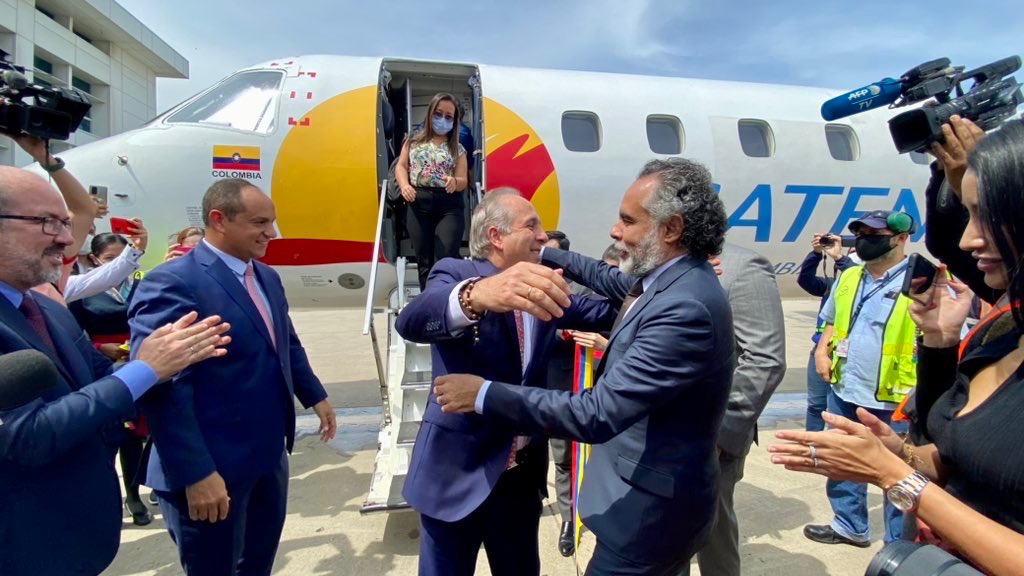Colombia and Venezuela have resumed commercial flights after over two years of suspension, marking further improvement in the bilateral and trade relations between the two neighboring countries.
On Monday, November 7, an inaugural flight by the private Turpial Airlines took off from the Simón Bolívar International Airport near the Venezuelan capital Caracas to the El Dorado International Airport in Colombian capital Bogotá with around 50 passengers on board.
Likewise, on Wednesday November 9, a flight by the Colombian government-owned airline Satena departed from the El Dorado airport, bound for the Simón Bolívar airport, marking the mutual reactivation of commercial air transport operations. This flight also had 50 passengers traveling, including Colombian Transport Minister William Reyes.
The reopening of skies between the two nations has been celebrated by government officials in both countries.
Transport Minister Reyes in a tweet said that “Today is a day to celebrate! We continue working for the union between Colombia and Venezuela. Air connectivity generates progress and development for both nations.”
Colombian Ambassador to Venezuela Armando Benedetti described the event as historic. “Finally! Making history, the first international flight by Satena Airlines from Bogotá has just landed in Caracas. Relations between two sister countries continue to strengthen with open borders and skies,” tweeted Benedetti.
“We will continue to work hand in hand with the Venezuelan authorities to establish frequencies and air routes that allow us to expand air connectivity between Colombia and Venezuela,” he added in another tweet.
#YaEnCaracas, luego del primer vuelo de @AerolineaSatena a Venezuela, es una realidad el regreso del transporte aéreo entre los dos países. En Caracas fuimos recibidos por @rvaraguayan, nuestro homólogo venezolano, el embajador @AABenedetti y otras autoridades del hermano país. pic.twitter.com/CAKhgUsDtJ
— Guillermo Reyes (@MinistroReyes) November 9, 2022
Venezuelan Transport Minister Ramón Velásquez Araguayán also celebrated the resumption of flights on his Twitter account. “Today we received the first flight of the Colombian airline Satena, we predict a successful reactivation of operations between the brother peoples of Colombia and Venezuela. Always working for Peace and cultural exchange,” tweeted Velásquez.
“As of today we decree open skies between Venezuela and Colombia with 3 weekly flights, today the first flight of the Satena airline arrived in Maiquetía with 50 passengers on board. We celebrate the union of the Bolivarian peoples together with our president Nicolás Maduro,” he added.
For his part, Venezuelan Ambassador to Colombia Félix Plascencia said that “this is the result of a commitment to growth, cooperation, friendship and harmony between two neighboring countries and the same people.”
#7Nov Por instrucción del presidente @NicolasMaduro hoy se reanudaron las operaciones de transporte aéreo comercial con la República de Colombia, estamos contentos de conectar con este país hermano. Siguiendo el camino de hermandad y Paz de nuestro Libertador Simón Bolívar pic.twitter.com/ywN9FPKov0
— Ramón Celestino Velásquez Araguayán (@rvaraguayan) November 7, 2022
The countries had originally scheduled to reactivate flights, suspended since March 2020 due to the COVID-19 pandemic, on September 26, together with the reopening of the common land border. However, the Colombian government did not allow the Venezuelan state-owned airline Conviasa to fly to the country due to it being sanctioned by the Office of Foreign Assets Control (OFAC) of the US Treasury Department.
The resumption of flights between the countries took place a week after Colombian President Gustavo Petro traveled to Caracas to meet his Venezuelan counterpart Nicolás Maduro for the first time after re-establishing diplomatic relations in late August.
Following their first meeting on November 1, Petro and Maduro signed a joint declaration to further consolidate bilateral relations and mutual cooperation. The leaders discussed various issues of binational interest, including the “the revival and resolution of critical junctures in land, air, river and maritime transport.”
The diplomatic ties between Colombia and Venezuela have been consistently strengthening since leftist Petro’s inauguration in early August.
The two presidents appointed ambassadors to each others’ nations and officially restored political and diplomatic relations on August 29, after over three years of broken ties. On September 26, the governments reopened their common land border, exchanged cargo trucks, and restarted trade between the countries after seven years of closure.
Recently, during the ongoing COP27 climate summit, Petro and Maduro came together to protect the Amazon. Along with Suriname’s President Chan Santoki, they called to create an alliance of nine countries for the protection of the Amazon rainforest, the world’s largest natural forest.
Petro announced that Colombia would allocate USD 200 million per year for the next two decades to save the Amazon. Santoki proposed the creation of a group of scientists dedicated to the conservation of the Amazon. Maduro called for the strengthening of the Amazon Cooperation Treaty Organization (ACTO), an intergovernmental institution that encompasses Brazil, Bolivia, Peru, Ecuador, Colombia, Venezuela, Guyana, and Suriname.





